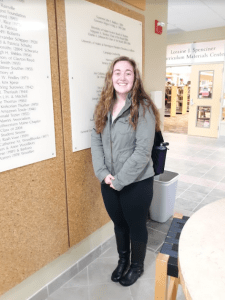Melissa Wood Contributing Writer
The pre-registration process can be an uphill battle for students as they juggle lists of general-education requirements and core classes for their majors. Freshmen tend to be particularly vulnerable to getting lost in the process as they are often faced with misinformation and a lack of guidance, resulting in falling behind in their course completion and having to stay in school for an extra semester, or year, to complete graduation requirements.
Community health major and freshman, Julia Halley, spoke about her experiences so far with pre-registration. Coming into her freshman year, she had no idea what pre-registration even was. When Halley attended the Summer Experience week for incoming freshmen this summer to get a taste of the college experience, she realized that she hadn’t registered for any of her classes for the upcoming fall semester.
Halley had to enlist the help of CA’s that week to put her schedule together as she was lost on how to do it herself. “They were very helpful, of course,” said Halley. But with everyone else already signed up for their classes, she wasn’t left with many choices.
Since Halley signed up for classes late she came across a difficult situation.“I only had 14 credits starting out,” she said, “but next semester I will have 18 so I can catch up.”
The knowledge that she will have to take 18 credits in only her second semester at UMF has Halley feeling the pressure. “I’m a bit stressed with knowing I have to take that many credits next semester but I know I will be able to figure it out,” she said in a follow-up email interview. The credit load may force her to drop a few of the eight dances she is in, one of which she is choreographing for Bust A Move Beavers (BAM).
Halley is also facing a crisis of missing out on specific courses she needs. “I signed up for classes such as calculus and [First Year Seminar (FYS)], but I didn’t get into them because I signed up later than most people,” said Halley via email. She will have to take her FYS as a sophomore.
Halley is currently looking into winter term courses to get her up to speed with the rest of her class and keep on track to complete her studies in the standard four-year timeline. “I just wanted to catch up ASAP to ensure I’ll graduate on time,” said Halley via email.
As a community health major she must also have a concentration within the major. “I am very stressed about my Nutrition and Physical Fitness concentrations,” said Halley, “and mostly not being able to get into the classes I need.”
Her advice to next year’s freshman to avoid falling into the same tough spot she’s in is to, “Get in contact with your advisor as soon as possible. Know what you are going to be doing before you get here.”
She’s optimistic for next semester to get easier since she has been walked through the process now. “Even though it was stressful it should get easier,” she said.
When freshmen and other students in Halley’s position need more help than their advisor can offer, or need someone easier to relate to, they can turn to peer advising. That is why sophomore Bailey Blow has become a peer advisor for early childhood special education first-year students.
When she started out as a freshman she explains how “it was kinda of stressful,” said Blow, “I didn’t know what Mainestreet was, Mycampus, basically anything.” But she found success with peer advising. “They helped me get less confused,” said Blow.
As her time came to register for classes she had a lot on her mind. “{The] Actual day of registration was stressful,” she said, “Making sure I was prepared for that morning was helpful.”
With all the help she received her first year, she wanted to become a peer advisor. “Having a peer advisor is beneficial; they help you understand everything, connect with you, and are always there to answer your questions.”
She explains that the freshmen are stressed because they are doing it on their own, but peer advisors are there to help and answer any questions. “Some advice to any freshman, I encourage you to ask any questions or express any concerns you have,” said Blow, “We are here to help.”
Vanessa Schaeffer embarks on her 5th year and last journey through the pre-registration and registration process. She remembers her difficult and easy times with it all.
During her first semester she had a hectic introduction to pre-registration. “I came in as a visual and performing arts major and had many requirements,” said Shaeffer, “but my advisor wasn’t the best when it came to helping me. They didn’t clarify what I needed for classes and why.”
When she wasn’t able to get the help she needed from her advisor she had to seek support from other people on which direction to take. “It seemed like even they didn’t know what to do either.”
She came across Dawn Nye, her other advisor in this process. “[She was] the best person to get help from,” said Shaeffer. “She was amazing! [She] was extremely organized and well put together and knew what she was doing.”
After wading through the pre-registration process once, though it was difficult, she found the second round of registration in her second semester to be much easier. “My advisor was very surprised with how quick I could go through the process each time,” she said.
Shaeffer decided to switch her major her second semester of her junior year to just performing arts. “Just having to switch advisors was the hardest part,” she said.
With all that Shaeffer had learned throughout her years here at UMF she shared some advice for any freshman out there. “You don’t need to know your major,” she said, “just try and get all of your gen eds out of the way.”

